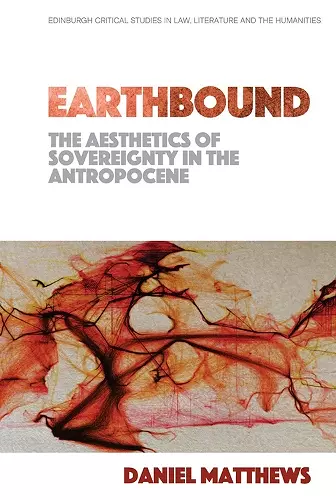Earthbound: The Aesthetics of Sovereignty in the Anthropocene
Format:Hardback
Publisher:Edinburgh University Press
Published:31st Aug '21
Currently unavailable, and unfortunately no date known when it will be back

Daniel Matthews shows how sovereignty - the organising principle for modern law and politics - depends on a distinctive aesthetics that ensures that we see, feel and order the world in such a way that keeps the realities of climate change and ecological destruction largely 'off stage'. Through analysis of a range of legal, literary, ecological and philosophical texts, this book outlines the significance of this aesthetic organisation of power and explores how it might be transformed in an effort to attend to the various challenges associated with the Anthropocene, setting the grounds for a new, ecologically attuned, critical jurisprudence.
Daniel Matthews’s Earthbound makes a convincing case for why the response to climate change is not a serious challenge but the serious challenge for our time. He shows us that the comfortable division between the social and the natural has been erased and so the very boundaries and scope of human agency must be re-evaluated and reconsidered. Given that the great conceit of Western forms of sovereignty is that it controls and determines everything within its boundaries, we see that the advent of the Anthropocene gives a new and terrifying power to sovereign authority. In grappling with this challenge, Matthews does not suggest jettisoning sovereignty as such, especially as there are many forms of sovereignty, including indigenous ones that inherently recognize the fact of human existence within the context of—rather than above—nature. Instead, he looks at the aesthetics of sovereignty, how it shapes us even as we use it to shape the world around us, in order to rethink and redeploy key concepts of the Western and globally dominant mode of sovereignty, specifically in terms of territory, people and scale. This unique way of understanding sovereignty allows Matthews to add some teeth to the idea of rethinking the way we live in the world. Whereas such calls can be, and usually are merely gestural, by drilling down into the sediment of how sovereignty is lived and experienced, rather than just wielded, Matthews shows a path to action instead of just more talk. For this reason alone his work is both timely and critically vital. * James Martel, San Francisco State University *
- Winner of Law, Literature and Humanities Association of Australasia: Penny Pether Prize 2021
ISBN: 9781474455305
Dimensions: unknown
Weight: unknown
224 pages